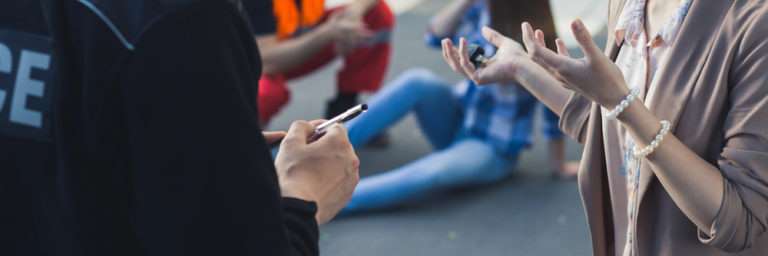
When building your car accident case, witness statements will serve as valuable pieces of evidence. Witnesses could include passengers in the vehicle with you, bystanders, law enforcement officials, and field experts. In their witness statements, these individuals will need to include:
- Their legal name
- Address and contact information
- The date, time, and location of the incident
- How the incident happened
- Observations about property damage and injuries
Witnesses’ statements should be purely factual. They should refrain from giving any unnecessary information or opinions about the matter. Additionally, per NRS §50.035, all witnesses must have actual knowledge of an event––they cannot rely on secondhand information or speculation.
Our legal team can collect witness statements for you. We want you to focus on your recovery.
How We Collect Strong Witness Statements
When you entrust your case to us, we will take the following measures to collect witness statements:
- We will track down people who saw the accident happen.
- We will ask them to write down their account of events, along with other information to verify their story.
- The witnesses will need to sign at the bottom of each page.
We will ask for these statements in writing. This way, no one will be able to edit witnesses’ words out of context.
What Makes a Good Witness Statement?
For starters, each witness statement should be concise, clearly written, and organized. The insurance company will no doubt look for ways to discredit your claim. If any piece of information is not clear, or there is room for interpretation, this can discredit a given statement.
A good witness statement should be:
- Free of misspellings
- Straight to the point
- Based on firsthand observations
- Refer to the collision in question
- Signed by the witness
A good witness statement should not include accusations of fault. Determining fault should be left to the involved insurance companies and legal counsel, not witnesses.
Who Can Give a Witness Statement?
Some witness statements will be more valuable than others. For instance, eyewitnesses who actually saw the accident happen will have more clout than people who arrived at the accident scene afterward.
You could get witness statements from the following people:
- Bystanders. If your accident happened at a busy intersection, other motorists, passersby, and pedestrians could give information about the moments before, during, and after the accident.
- Law enforcement officials. If the police were called to the scene of the accident, their testimony could be important. You do not need to ask these witnesses to write statements though; their testimony will be included in the police report they filled out.
- Expert witnesses. Accident reconstruction specialists and healthcare professionals can provide unique insight into your case, such as the cause and severity of your injuries.
These are just some of the witnesses who could help your case.
Additional Pieces of Evidence That Could Support Your Claim
A car accident witness statement is just one piece of evidence that could support your case for compensation. You will need more information to show that because of another party’s negligence, you got hurt and suffered various losses.
Other pieces of evidence in your case could include:
Traffic Camera Footage
Our legal team can secure any traffic camera footage that captured your accident. This could help us prove fault for the accident and verify certain aspects of witnesses’ testimony.
Photos of the Accident Scene
Photos of the accident scene should include:
- The involved vehicles’ damage
- The accident scene itself
- Skid marks, broken glass on the roadway, and pieces of metal
You may not have been able to take these photos because of your injuries. If so, that is okay; the attending law enforcement officials may have been able to do it.
The Police Report
Earlier, we mentioned that the police report could serve as an integral part of your case. This document can include the following information:
- The names of the involved parties
- The location of the incident
- What happened
- The date and time of the collision
- The points of impact on each vehicle
The police report may also contain information about whether an ambulance was called and anyone went to the hospital.
The Vehicles’ Black Box Data
Some cars are equipped with sensors or other technology that records information like:
- The speed that the car was traveling before the incident
- The force of impact
- The time when the car was hit
- Airbag deployment
- When the brakes were pressed
Not all cars come with black boxes. If neither car in your case had one, then we can consult engineers and mechanics about various aspects of your case.
You Don’t Have to Worry about Getting a Witness Statement By Yourself – We Can Help
You do not need to worry about locating witnesses, taking down their information, and gathering evidence. High Stakes Injury Law can do that for you and use our 60 years of combined experience to build your car accident case. All you have to worry about is getting better.
To begin your free, no-obligation case review, call (702) 605-6671. You only have two years to file your potential lawsuit under NRS §11.190(4)(e), so we encourage you to call us today.

